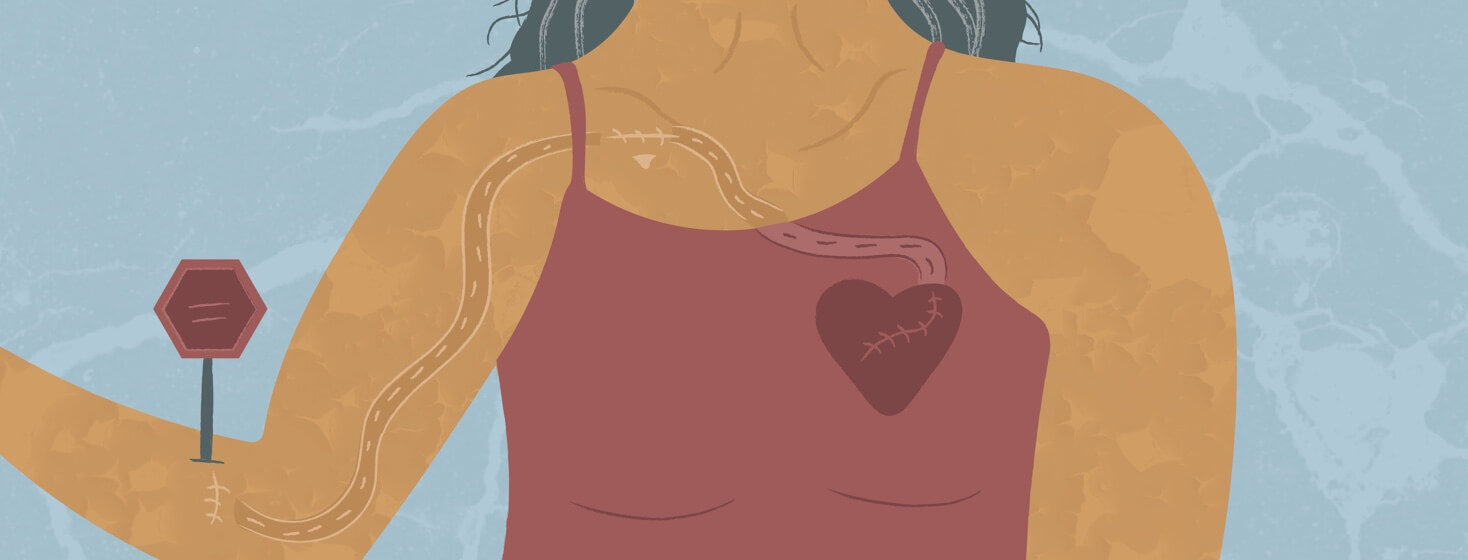Scars as a Road Map of Where We've Been
When most people hear the name Scott Hamilton, ice skating glory comes to mind. But the Olympic gold medalist is also a cancer survivor. And it sounds like he approached testicular cancer and a brain tumor with an attitude as worthy of applause as his backflip.
“Now I look in the mirror and see all the scars from all the different injuries and surgeries and all the other things, and I look at them differently than I thought I would,” he said on the show “Only a Game,” produced by public radio station WBUR FM.
“Normally, you look at scars as, like, disfigurements. And I look like at them as, you know, sort of badges of honor. It's, like, that skin is tougher than it’s ever been,” he said.1
AML led to physical scars
When I heard the interview while driving the other day, I thought of similar words that my cousin Bob said to me when he drove me to appointments many moons ago. It was 2003. I was concerned about the scar, on my collarbone, from the first of two Hickman catheters.
“Your scars are a roadmap of what you’ve survived,” he said.
The Hickman actually leaves two scars: a line near the collarbone and an irregular little shape below it. They are faint now. During a hospitalization when I didn’t have a Hickman and needed infusions, I also got a PICC line. It left a scar, like a railroad track, on the inside of my left arm, and it left a memory of the nurse having trouble feeding it in.
My cousin, my caregiver
My cousin was a mensch who helped me get through my first bout with AML. He lives in New Hampshire, about an hour from me. He would drive down to pick me up and take me to the Dana-Farber Cancer Institute in Boston – another hour and a half or two. Then he would drive me back before heading on to his own home.
He was in business for himself and worked his schedule around driving Miss Ronni. He calmed me down by telling me that the statistics were in my favor, and he put up with me when I asked him to repeat what he said. He wasn’t a medical person but I figured that his MBA from Harvard made him authoritative. His big hearty laugh was good medicine in itself.
We had had some special cousin time in better days. We had gone to California, with our mothers, for another cousin’s wedding. At the hotel, we decided to meet in the morning for a run on the streets alongside the Pacific Ocean. We each showed up wearing the same outfit: a purple tank top and dark colored shorts. We got a good laugh out of it.
Baseball led to emotional scars
There was nothing funny about what in our eyes was a catastrophe that occurred shortly after my transplant.
The Boston Red Sox were facing the New York Yankees in the American League Championship Series. The series was tied 3-3 entering game seven on Thursday, October 16th, 2003. Manager Grady Little left Pedro Martinez on the mound for too long. Tim Wakefield came in in the 10th and pitched a scoreless inning. At the bottom of the 11th, Aaron Boone hit a home run off a flat knuckleball.
The Yankees won the game, and the series.
Scars will fade
The next day Bob drove me to Boston. We kept asking, “How could he?” meaning why did Grady Little leave tired Pedro in. In Boston, people had draped “Damn Yankees” signs where they could. People hung their heads in the Dana-Farber waiting room. I imagined that the heavy mood had as much to do with baseball as with cancer. People in Boston and environs take their baseball very seriously.
On the way back, in the car, we consoled each other. We couldn’t know that the next year, the Red Sox would finally break the curse and win the World Series. The scars would fade, just as all the others did.

Join the conversation